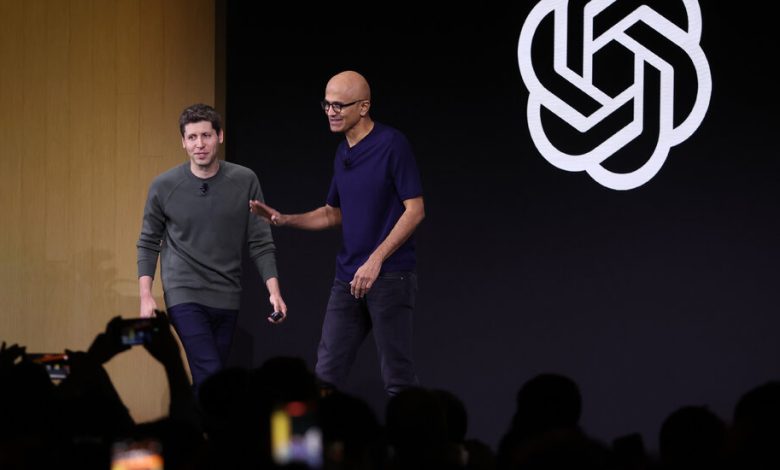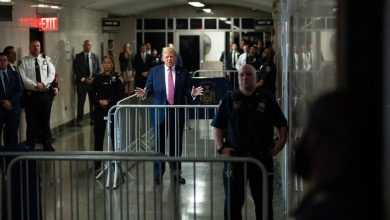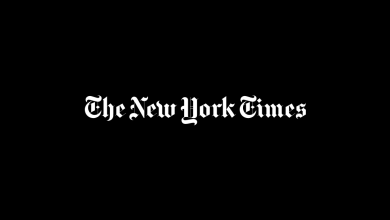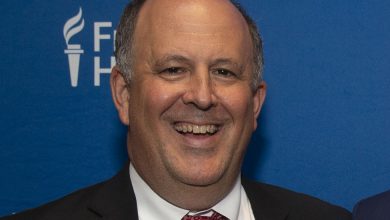Does A.I. Have an Inherent Governance Problem?


The shake-up heard around the tech world: Sam Altman, the ousted C.E.O. of OpenAI, is now working for Satya Nadella of Microsoft.Credit…Justin Sullivan/Getty Images
OpenAI’s structural messiness
The future of OpenAI, whose ChatGPT kick-started an arms race in artificial intelligence, has grown even cloudier. A majority of its workers called on its board to resign after ousting Sam Altman as C.E.O. over how fast to commercialize its technology.
The conflict further underscores the peculiar oversight atop some of the leading companies in A.I. that could affect the future of the technology. And there are signs that OpenAI’s board may not relent despite the staff uprising.
Here’s the latest: Over 700 of OpenAI’s 770 employees — including Ilya Sutskever, the chief scientist and board member who initially pushed to remove Altman — demanded that the board resign. Altman is still trying to return as C.E.O. and is in talks with the company. The OpenAI board had approached a top rival, Anthropic, about a merger, according to The Information. Marc Benioff of Salesforce is trying to lure OpenAI employees with cushy financial offers.
OpenAI’s dilemma: Commentators have noted the company’s unusual, conflicted, structure. A nonprofit board with a mission to benefit humanity oversees a for-profit arm backed by Microsoft and venture capital firms including Thrive Capital and Khosla Ventures.
The entire enterprise’s goal is to build an artificial general intelligence, highly autonomous systems that “outperform humans at most economically valuable work” but “benefits all of humanity.” OpenAI’s commercial arm was created to support that enormously expensive goal, but it is hemmed in by limits on profits that flow to investors, as well as no governance rights for investors. That’s why Microsoft, Thrive and others have little direct leverage on how the company is run.
Ironically, Altman helped devise this setup — and eventually fell victim to it.
That’s not the only unusual corporate structure in the A.I. industry. Anthropic, begun by a dozen ex-OpenAI employees concerned about their former employer’s race for profits, is set up as a B Corp, or public benefit corporation, that is meant to balance the interests of a wide array of stakeholders.
It also has a so-called long-term benefit trust that includes A.I. ethicists and other experts and is allowed to choose a majority of the company’s directors. (That said, one of Anthropic’s board seats is held by an investor, though that’s subject to change.)
But OpenAI’s structure may lead to an irreparable clash. Investors including Thrive are still pushing to reinstall Altman as C.E.O., as are employees and Sutskever.
Still, the employee letter noted an ominous development for that camp: “You also informed the leadership team that allowing the company to be destroyed ‘would be consistent with the mission.’” Reports suggest that, despite the prospect of investors suing over the board’s actions, the resolve of the remaining three directors has hardened — and if OpenAI fails, so be it.
HERE’S WHAT’S HAPPENING
X sues a media watchdog over research into its advertising. Elon Musk’s social network made good on a threat to take Media Matters to court over the group’s assertion that the company placed ads next to antisemitic content. The findings, along with controversy over recent posts by Musk, prompted big-name advertisers like Apple and IBM to pause their spending on X; the company said Media Matters had manipulated its algorithms to support its findings.
U.S. regulators put more pressure on crypto giants. The Justice Department is seeking a $4 billion penalty from Binance, the world’s largest crypto exchange, to settle an investigation into accusations of money laundering and fraud, according to Bloomberg. And the S.E.C. sued Kraken, a rival, over claims that it operated an unregistered securities exchange.
Citigroup is readying layoffs for hundreds of managers. The long-awaited move, announced on Monday, is the latest step in a plan by Jane Fraser, the bank’s C.E.O., to simplify the Wall Street giant’s structure and reduce costs. Citi has already laid off over 7,000 workers as it grapples with a slowdown in deals and high interest rates.
Wall Street braces for disappointing housing data. Existing home sales, due out at 10 a.m. Eastern, are expected to have fallen to a 13-year-low as rising mortgage rates price more buyers — especially younger house hunters — out of the market.
What Microsoft has gained from the OpenAI mess
OpenAI’s biggest backer, Microsoft, is riding high, with the tech giant’s shares hitting a 22-month high on Monday.
Satya Nadella, Microsoft’s C.E.O., has been on a media tour since hiring the now-ousted OpenAI boss Sam Altman and Greg Brockman, another co-founder, and trying to cement its position as an artificial intelligence leader. One big talking point: how the company structured its deal with the start-up and access to its intellectual property.
Altman and Brockman will run Microsoft’s A.I. research lab. After most of OpenAI’s remaining staff threatened to quit, Altman and Brockman could ultimately recruit hundreds more from their former employer. That would allow Microsoft to essentially rebuild “OpenAI inside Microsoft and not lose much time or money,” reports Karen Weise for The Times.
Some investors want the OpenAI co-founders to go back, including Thrive Capital, Khosla Ventures and Tiger Global Management, to protect their investment. (Vinod Khosla also called for OpenAI’s interim C.E.O., Emmett Shear, to resign “before he becomes the only employee of OpenAI.”)
Even Nadella is open to the possibility — with one big caveat. Microsoft had no official say with the board when Altman, the company’s key contact, was fired. Nadella told the “On With Kara Swisher” podcast that if Altman and Brockman return to OpenAI, “we will make sure that the governance gets fixed so that we have more surety and guarantee so that we don’t have surprises.”
But Nadella was adamant they have the tools to innovate regardless. Microsoft has secured the rights to OpenAI’s intellectual property, as well as copies of the source code for its key systems and the “weights” that guide the system’s results after it has been trained on data, people familiar with the deal told The Times. That is partly as a hedge for the fact it has no control over the start-up’s board.
There is one big exception. It involves the holy grail of OpenAI’s work: achieving artificial general intelligence, or A.G.I. OpenAI defines that advancement as “a highly autonomous system that outperforms humans at most economically valuable work.” To achieve the promise of A.G.I., it needs immense compute power, the very thing Microsoft is providing. The caveat: A.G.I. is off-limits to Microsoft.
Still, Microsoft’s I.P. deal could be troublesome. Scott Syphax, a corporate governance expert, told DealBook that the deal could raise red flags with regulators if it threatens the nonprofit’s tax-exempt status. Another area Syphax is watching: the valuation that Microsoft placed on OpenAI after its investment and whether it acquired the I.P. at a fair price.
Some veterans of the Silicon Valley start-up wars applauded Microsoft’s maneuvering. “If you told me 10 years ago that a group of the smartest engineers in the land would evoke the threat, ‘Do what I say or I will go to work at Microsoft,’ I would not have believed you,” Bill Gurley, a general partner at Benchmark and an investor in Grubhub, Uber and Zillow, posted on X, adding “much credit to Satya.”
But others wondered what Microsoft was thinking in the first place by making such a big bet on OpenAI “without any real governance controls.”
“People say, ‘Economists don’t know why we’re unhappy? Just look at the prices!’ We’re looking at the prices, and we’re wondering, why are you buying so much stuff?”
— Betsey Stevenson, an economist at the University of Michigan who worked in the Obama administration, on the disconnect between Americans’ perception of the economy and their actual experiences.
Goldman rethinks a golf deal
Goldman’s first big bet on sports sponsorship is coming to an end. The bank will not renew its endorsement deal with the golfer Patrick Cantlay, DealBook’s Lauren Hirsch is the first to report.
The deal was part of the bank’s consumer push. Goldman signed a three-year agreement with Cantlay in 2020, partly to help build brand awareness of Marcus, its online consumer banking service. Cantlay, currently ranked fifth in the world, wore a Marcus-branded hat during tournaments, and the two sides signed a new one-year deal at the start of 2023.
But Goldman has pulled back from retail banking. The bank has sold off chunks of Marcus and restructured the business to refocus on its traditional investment banking and trading services. “We constantly evaluate the firm’s partnerships, and at this time, our logo will no longer appear on his hat,” Tony Fratto, a spokesman for Goldman Sachs, told DealBook.
Cantlay and Goldman will still have some links. He may still feature at the bank’s events going forward, a person familiar with the relationship told DealBook. And both Cantlay and Mark Flaherty, a Goldman director, sit on the PGA Tour’s board of directors, which is trying to navigate a partnership with Saudi Arabia’s sovereign wealth fund and courting new investors.
THE SPEED READ
Deals
-
McDonald’s agreed to buy out Carlyle’s stake in the fast-food chain’s China business for about $1.8 billion. (Bloomberg)
-
The power utility NRG Energy will replace its C.E.O. and overhaul its board after a monthslong campaign by the activist investor Elliott Management. (FT)
-
Professional Fighters League, whose backers include Saudi Arabia’s sovereign wealth fund, agreed to buy a rival, Bellator, to better challenge the Ultimate Fighting Championship. (BBC)
Policy
-
The parent company of Truth Social, Donald Trump’s social network, sued 20 media publishers, accusing them of a “deliberate, malicious and coordinated attack.” (Bloomberg)
-
“How a crypto super PAC is trying to swing 2024” (Politico)
Best of the rest
-
TGL, the indoor golf league founded by Tiger Woods and Rory McIlroy, delayed its inaugural season by a year after its arena’s roof collapsed. (CNBC)
-
Eight years after retiring from “The Late Show,” David Letterman finally visited the late-night program he hosted for two decades. (NYT)
We’d like your feedback! Please email thoughts and suggestions to [email protected].




